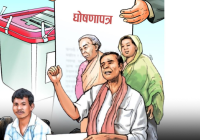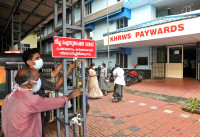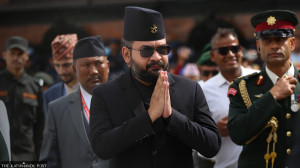Opinion
Hazardous complacency
Any political gimmick to deny the legimate demands of the Madhes will push the nation into further chaos
Bhabes Kumar Labh
Nepal had not even begun to recover from the April quake when the Madhes movement began. The ‘blockade’ at the Nepal-India border has made matters worse. The nation is currently reeling under a severe shortage of essential commodities and petroleum products, and incurring huge financial loses. Some districts are reportedly running short of life saving drugs too. The education, health, tourism, and industry all have been badly affected, and life has come to a virtual standstill. And yet, the crisis it does not seem as though the crisis will end anytime soon.
KP Oli’s election as the new prime minister of the country seemed to arouse hope among people living mainly in the northern part of the country. Many expected Oli to end the blockade and help the country return back to normalcy. Oli even took oath in the name of the people—contrary to the tradition of taking the name of god—to show his commitment to the people. However, his government has already spent three weeks in power without making life any easier for the Nepali people. It seems as though the Oli needed a person of his preference to be elected as president more urgently than ensuring gasoline, medicines, and other essential commodities to the people.
Chinese alternative
It is always in any country’s best interest to have multiple reliable suppliers of essential goods rather than to be solely dependent on one. However, Nepal’s options seem to be limited to two countries: India and China. Thus, fuel-strapped Nepal turned to China after the de-facto fuel and trade embargo imposed by India, and struck a deal to import petroleum products from a Chinese company, ending a long-held monopoly of the Indian Oil Corporation.
China even pledged to provide 1,000 tonnes of petroleum products to Nepal as grant. However, grants always come attached with national interests attached except in disasters. For now, we will have to see how Nepal will be asked to repay the northern neighbour in future. It will not be surprising if there are more severe crackdowns on supporters of the ‘Free Tibet movement’ in Nepal. But the fuel that has arrived from China will only be of use to the upper middle class and the rich who own vehicles. Moreover, meeting the deadline of November 25 to take the delivery of the petroleum grant from Kerung border point seems to be an overwhelming, if not impossible, task given the condition of the road. Transporting huge quantities of Chinese oil across the Tibetan plateau and then on narrow hilly roads in Nepal would be an arduous task.
Whether China will be a viable fuel supplier as per our needs at the existing price is still unknown. Yet, we can now expect more involvement of China in the political corridors of Kathmandu, but probably not as much as India. It will be in our best interest, therefore, to maintain equidistance between the two neighbouring giants, and get maximum benefits from their emerging economies. But the prospect of it does not seem likely given the vulnerability and limits of our politicians. There is an ancient African saying: “When elephants fight, it is the grass that suffers”. Nepal should pay heed to this. The case of Lipu Lekh is a pertinent example.
The oil from China is certainly going to ease the pressure on the government and could make it more complacent and more insensitive towards the misery and legitimate demands of the Tarai-Madhes. The Madhesi-Tharu have intensified their movement with more vigour and determination after Dashain. The excessive use of force to crush their voice has only further emboldened them in their fight against injustice. And the current trade and fuel embargo at the border points make it clear that the government cannot bypass and befool the plains any more.
Time to act
People from every corner of the Madhes are participating in the ongoing protests and it is no longer under the complete control of the Samyukta Loktantrik Madhesi Morcha. In fact, the Madhesi and Tharu communities spontaneously protested against their marginalisation without political influence as the
constitution fails to guarantee their rights. Still, armchair columnists in Kathmandu and pseudo-nationalist journalists and intellectuals are hell bent on defaming the movement as a ploy to divide the nation at Indian provocation. But, even the Pahadi community in Tarai districts of Mahottari, Sarlahi and Saptari took out rallies to express their solidarity and support to the ongoing movement. Are those people from the Pahadi community provoked by India as well? Are all of them secessionists? Not at all. Any further avoidance of the justifiable demands of the Madhesi people by the government, however, could fuel secessionist sentiments as done by CK Raut in the past.
The new constitution is certainly a great achievement but not, as claimed by some vain politicians, perfect. The voices and aspirations of the historically marginalised Madhesis, Tharus, and indigenous people must be accommodated in the constitution through amendment. Any political gimmick to deny their legitimate demands will push the nation into further chaos.
Labh is a lecturer at Saraswati Multiple Campus, Kathmandu




 11.12°C Kathmandu
11.12°C Kathmandu










